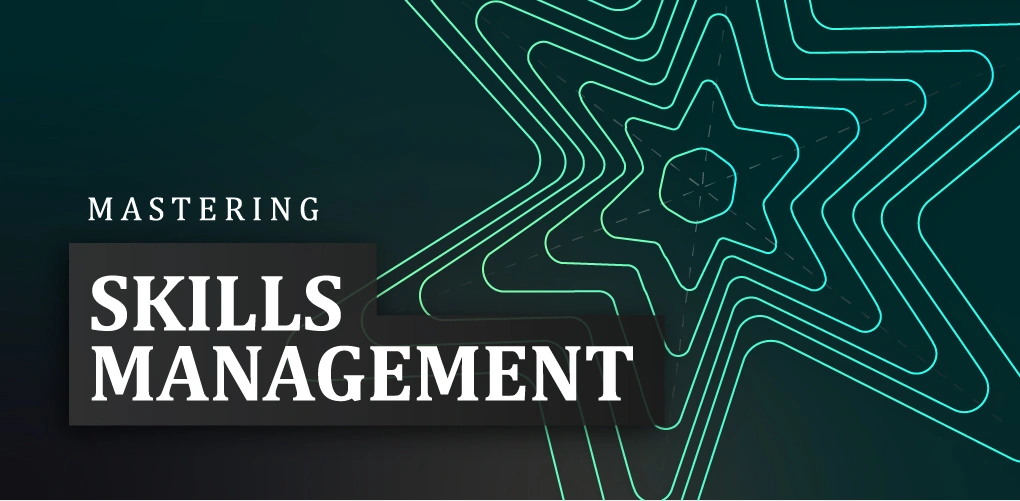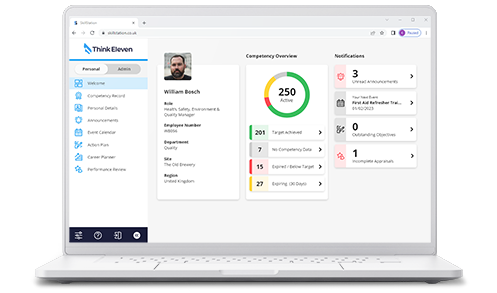Learn how skills management and competency management systems can help your business bridge skill gaps, boost productivity, and future-proof your workforce.
Effectively managing the skills and competencies of your workforce is essential for the long-term success of an organisation. The skills and knowledge of your people directly influence the capability of the wider organisation to deal with the challenges thrown up by dynamic economic times we’re living through - your adaptability, the ability to maintain a competitive advantage, and to further the strategic goals efficiently and sustainably.
In this article, we’ll explore what skills management entails, why it matters, and how implementing a dedicated system can be the catalyst for transformative change in your organisation.
What is Skills Management?
The process of skills management is to undertake the identification, tracking, and development of the skills that are needed to achieve the fundamental objectives of the organisation. For example, meeting certain quality standards, sales targets, production numbers etc.
Skills Management involves processes such as:
- Identifying skill gaps: Understanding the difference between what skills exist within the organisation vs. what is currently or projected to be needed. For example, before undertaking a new project, required skills can be highlighted and attained before commencement.
- Tracking skill development: Regularly assessing the capabilities of employees. This helps to identify if training programs are working effectively and can provide projections as to when new skills should be available.
- Development planning: Proactively building development pathways for upskilling, such as training, mentoring, or on-the-job training. This process can also help to identify and reduce single point failures - people with unique skills that may move to a new role, leave the business due to retirement or absence.
By proactively managing workforce skills, organisations can ensure resilience, capability and capacity to deliver greater productivity, and become / remain future-ready.
Why Skills Management matters
Effective management of skills matters for several reasons:
- Bridging Skill Gaps
As industries evolve, new technologies and methodologies emerge, often leaving teams with skill deficits. Skills management ensures that these gaps are identified and addressed promptly or ideally ahead of time. - Improved Employee Retention
The further development opportunities that coincide with skills management tends to appeal to employees and has a positive effect on moral and employee engagement. Investing in skills management will foster a culture of growth, demonstrates to employees that they are valued and contributes to reducing staff turnover rates. - Increased Productivity
A well-trained and competent workforce performs more efficiently, completing tasks accurately and on time. The processes involved in skills management compliment other activities and initiatives (Lean tools for example) allowing for productivity gains to be more easily identified and implemented. - Futureproofing the Workforce
A strategic approach to skills management will help to prepare an organisation for changeable market conditions, ensuring adaptability and resilience.
How a Competency Management System can help with Skills Management
A comprehensive competency management system like SkillStation, alleviates the complexity of skills management by offering a range of features to make the entire process easier to deliver effective results. These features include:
- Single Source of Truth: for all your training, skills, competence, and compliance records. Information at your fingertips.
- Centralised Skills Tracking: Store, organise, and access training, skills, and assessment data in one place.
- Competency Assessment Tools: Understand workforce capability and show learning and development needs with a range of assessment tools.
- Development Planning Tools: Create tailored learning pathways to upskill employees.
- Progress Monitoring: Measure and report on the impact of training to ensure continual growth.
These features allow an organisation to make informed, data-driven decisions that align with organisational goals.
How to implement effective Skills Management
If you are looking to get started with skills management in your organisation, the steps below can act as a guide to begin the journey.
- Audit Your Workforce Skills
Assesses current workforce skills and identify the any gaps against organisational goals. - Define Competency Frameworks
Use a structured approach to define roles, competencies, and proficiency levels needed. - Leverage Technology
Implement a competency management system to streamline tracking, assessments, and reporting. - Invest In Training and Development
Provide employees with targeted learning opportunities, including in the job training, workshops, eLearning, and coaching. - Regularly Review and Adjust
Skills management is an ongoing process. Continuously review competencies and adapt to new demands.
Conclusion
A robust approach to skills management is the backbone of a productive, engaged, and future-ready workforce. By adopting a competency management system to assist and augment this process, organisations can go further to unlock the full potential of the workforce and maintain or develop a competitive edge.

